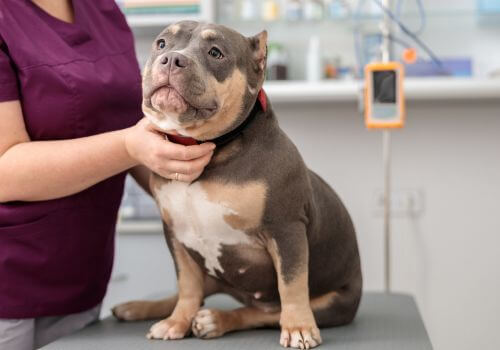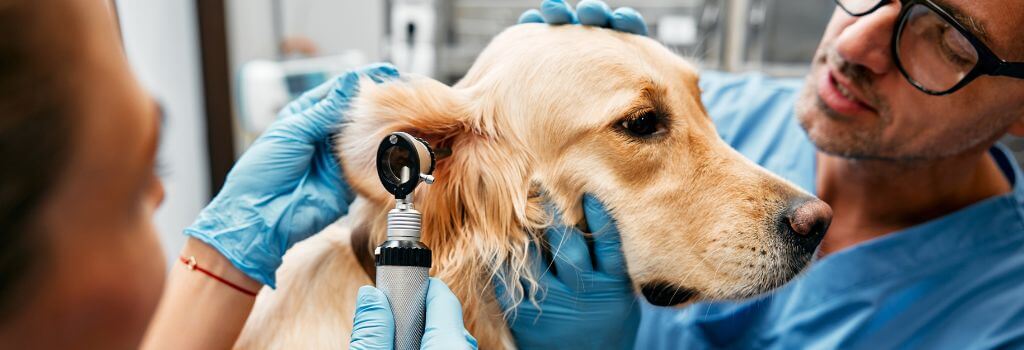While most dedicated dog owners visit the veterinarian when their pets are sick, many overlook the importance of regular wellness exams for maintaining their dog's overall health and longevity. Establishing a solid wellness routine is important to your dog's long-term well-being. We're glad you've you’re here checking out proactive care for your dog, and we're here to help! At LifeCare Pet Hospital, we're committed to providing the accurate information you need to keep your dog as healthy as possible. Unfortunately, not all online sources are reliable, so we've answered the most common questions about dog wellness to help you get your pet on the path to optimal health.
If you're in search of a skilled and compassionate veterinarian in Chantilly, VA, we'd love to assist you in caring for your dog and any other pets. If your dog hasn't had a wellness exam recently (or ever!), that's the first step, so please call us today at (703) 643-9818.

What is involved in a dog wellness exam?
A dog wellness exam at LifeCare Pet Hospital is a comprehensive check-up we recommend every six months. During this exam, we thoroughly assess your dog’s musculoskeletal system, eyes, ears, mouth, lymph nodes, skin, and paws. We also discuss any concerns you may have and review your dog’s lifestyle to confirm they're on the best path to health.
The progression of a dog wellness exam typically includes:
- Taking your dog’s temperature, which should be between 100 and 102.5°F—different from the human average of 98.6°F.
- Conducting an eye examination looking to see if their eyes are bright and healthy.
- Using an otoscope to examine the ears for any signs of discharge, redness, or abnormalities.
- Inspecting the mouth for healthy pink gums and assessing dental health, including tartar buildup and signs of gingivitis.
- Examining the throat to ensure everything is normal.
- Feeling the lymph nodes for any unusual enlargement.
- Palpating the abdomen to check the kidneys, bladder, and spleen.
- Listening to the heart and lungs with a stethoscope to monitor heart rate, rhythm, and lung function.
- Checking the reproductive organs, particularly in intact males and females.
- Performing a rectal exam as your dog ages.
What should I bring to a wellness exam?
For a successful wellness exam, bring a detailed history of your dog’s behavior at home, including what you consider normal and any unusual changes. If your dog is older and on prescription medications, bring a list of those medications. Also, note the brand and type of dog food you’re feeding your pet.
How does dog wellness impact longevity, and why is early detection important?
Just like in humans, prevention is far more effective than treating a condition after it develops. Many diseases can be managed or even prevented if caught early. For instance, it's much easier to prevent heartworm disease than to treat it after it occurs. Early detection of conditions like heart murmurs or cancer allows for earlier interventions, which can significantly improve your dog's quality of life and longevity. Wellness exams often reveal hidden issues, as dogs can be very stoic and hide symptoms well.

When should I bring my dog in for a wellness exam?
It’s important to bring your dog in for a wellness exam as soon as possible, especially if they're new to your home. Ideally, you should schedule their first visit within a few days of bringing them home. For puppies, we recommend starting wellness exams as early as six to eight weeks of age. After that, annual wellness exams, with a semi-annual check-up in between, are key to maintaining your dog’s health. If your dog is overdue for an exam, please contact us at (703) 643-9818 to schedule an appointment.
Will additional testing be needed beyond a wellness exam?
In addition to the basic wellness checks, we may recommend further testing such as heartworm testing, fecal checks, and, for older dogs, urinalyses. Establishing baseline blood work is also important. Depending on what we find during the exam, additional tests like x-rays, ultrasounds, or skin tests might be necessary to diagnose any underlying conditions.
Some tests that might be recommended include:
- Blood work
- X-rays
- Ultrasound
- Urine tests
- Fecal tests for parasites
- Skin tests
- Ear cytology if ear issues are suspected
How do you assess a dog’s wellness?
We assess your dog’s wellness by establishing a baseline of what's normal for them. During the exam, we check the eyes, ears, heart, lungs, and temperature, while also looking for other signs like lymph node enlargement or dental disease. We may also perform range of motion exercises to evaluate the musculoskeletal and neurologic systems.
What are some wellness recommendations?
During a wellness exam, we often make recommendations related to your dog’s age and lifestyle. These can include preventive care, dental health, nutrition, and weight management advice.
Common wellness recommendations might include:
- Core vaccines
- Non-core vaccines based on lifestyle
- Heartworm prevention
- Parasite prevention
- Weight management tips
- Home dental care advice and possibly an in-office dental cleaning
- Behavior monitoring tips.
- Nutrition recommendations
What environmental factors can affect my dog’s health?
Your dog's environment plays a significant role in their overall health. Factors like whether your dog spends most of their time indoors or outdoors, the safety of their surroundings, and potential exposure to toxins or allergens are noteworthy considerations. Additionally, climate-related concerns, such as exposure to mosquitoes or extreme heat, should be addressed. Even feeding habits are an environmental factor, as overfeeding or excessive treats can negatively impact your dog’s health.

What is geriatric dog screening?
Geriatric dog screenings, often referred to as senior workups, involve a thorough evaluation of your older dog’s health. These screenings include blood panels, urine tests, tear tests, checks for hypertension, blood pressure monitoring, and x-rays for heart and organ health. Regular senior workups help detect age-related diseases early, ensuring your dog receives the best possible care as they age.
How do dog wellness exams influence subsequent treatments?
Wellness exams provide a baseline of your dog’s health, allowing us to track changes over time. If we detect new issues, such as a heart murmur or weight changes, we can address them promptly. Regular exams help us monitor your dog’s health and make informed decisions about any necessary treatments.
What are baseline diagnostic tests, and how do they help my dog?
Baseline diagnostic tests include measurements like weight, physical exam results, and blood work. These tests help us establish what’s normal for your dog, making it easier to detect any changes or abnormalities in the future. If any values fall outside the normal range, we can quickly determine if further investigation or treatment is needed.
If you have any more questions about dog wellness or would like to schedule your dog’s next wellness exam, please don’t hesitate to call us at (703) 643-9818 or email us at [email protected]. The American Veterinary Medical Association (AVMA) also highlights the importance of regular wellness exams, and we're here to ensure your dog enjoys a long, healthy life by your side.
